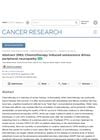 70 citations,
February 2015 in “Expert Opinion on Drug Discovery”
70 citations,
February 2015 in “Expert Opinion on Drug Discovery” Topical drugs and near-infrared light therapy show potential for treating alopecia.
 6 citations,
May 1986 in “Cancer Chemotherapy and Pharmacology”
6 citations,
May 1986 in “Cancer Chemotherapy and Pharmacology” The drug TGU was ineffective against small cell lung cancer and caused significant bone marrow suppression.
12 citations,
February 2022 in “Frontiers in Pharmacology” Asparagus racemosus and Withania somnifera can help reduce side effects of a cancer drug.
 43 citations,
February 2020 in “Clinica chimica acta”
43 citations,
February 2020 in “Clinica chimica acta” Nano-sized plant-based chemicals could improve cervical cancer treatment by being more effective and causing fewer side effects than current methods.
 159 citations,
September 2001 in “European Journal of Cancer Care”
159 citations,
September 2001 in “European Journal of Cancer Care” Chemotherapy-induced hair loss significantly affects patients' well-being, and nurses are key in helping them cope, but more research is needed to find effective treatments.
 218 citations,
January 2013 in “The Lancet Oncology”
218 citations,
January 2013 in “The Lancet Oncology” Chemotherapy causes hair loss by damaging hair follicles and stem cells, with more research needed for prevention and treatment.
 28 citations,
November 2020 in “Fluid Phase Equilibria”
28 citations,
November 2020 in “Fluid Phase Equilibria” Minoxidil dissolves better in propylene glycol + water than in supercritical CO2.
 1 citations,
February 2018 in “Orthopedics and rheumatology”
1 citations,
February 2018 in “Orthopedics and rheumatology” Combining Western chemotherapy with Traditional Chinese Medicine can reduce side effects and improve immune response in treating bone and soft tissue tumors.
 16 citations,
September 2018 in “Journal of Molecular Liquids”
16 citations,
September 2018 in “Journal of Molecular Liquids” The PS-b-PAA copolymer nanomicelles are effective for delivering a cancer treatment drug in photodynamic therapy.
 28 citations,
January 2017 in “Critical Reviews in Therapeutic Drug Carrier Systems”
28 citations,
January 2017 in “Critical Reviews in Therapeutic Drug Carrier Systems” Nanomaterials in biomedicine can improve treatments but may have risks like toxicity, needing more safety research.
 January 2023 in “International journal of advances in scientific research and engineering”
January 2023 in “International journal of advances in scientific research and engineering” Anthocyanins from fruits and vegetables may help prevent and treat colorectal cancer safely.
 2 citations,
January 2019 in “Springer eBooks”
2 citations,
January 2019 in “Springer eBooks” The conclusion is that different blood diseases cause specific oral symptoms and require varied treatments to manage these symptoms and improve patient health.
 117 citations,
March 2017 in “Nature Communications”
117 citations,
March 2017 in “Nature Communications” Macrophages help regrow hair by activating stem cells using AKT/β-catenin and TNF.
 11 citations,
March 2019 in “Journal of Medicinal Chemistry”
11 citations,
March 2019 in “Journal of Medicinal Chemistry” Some synthetic carbohydrate receptors, especially compounds 3 and 15, show strong potential for treating Zika virus.
 November 2022 in “CARDIOMETRY”
November 2022 in “CARDIOMETRY” A group has developed therapies that show promise for treating cancer and various other conditions.
 March 2014 in “Journal of The American Academy of Dermatology”
March 2014 in “Journal of The American Academy of Dermatology” The document lists various dermatology topics, treatments, and diagnostic methods.
 57 citations,
October 2021 in “Journal of ethnopharmacology”
57 citations,
October 2021 in “Journal of ethnopharmacology” Indian herbal medicine shows promise for treating skin diseases but needs more research to prove effectiveness.
 6 citations,
January 2018 in “PubMed”
6 citations,
January 2018 in “PubMed” Heavy metals might contribute to hair loss in Telogen Effluvium.

Scalp cooling is recommended to prevent chemotherapy-induced hair loss, but no effective drugs are available.
 47 citations,
July 2005 in “British Journal of Dermatology”
47 citations,
July 2005 in “British Journal of Dermatology” Topical vitamin D3 does not prevent hair loss from chemotherapy.
 19 citations,
July 2015 in “Journal of Ginseng Research”
19 citations,
July 2015 in “Journal of Ginseng Research” Korean Red Ginseng may protect against hair loss caused by chemotherapy.
 3 citations,
April 2021 in “Biomolecules & Therapeutics”
3 citations,
April 2021 in “Biomolecules & Therapeutics” The protein ER71/ETV2 helps regrow hair after chemotherapy by improving the growth of new blood vessels.
 1 citations,
February 1993 in “Nursing Standard”
1 citations,
February 1993 in “Nursing Standard” Many drugs, not just chemotherapy, can cause reversible hair loss.
 4 citations,
January 1977
4 citations,
January 1977 The book concludes that despite progress, cancer drug treatments have not met the expectations set in the 1960s and 1970s.
 724 citations,
April 2004 in “Lancet Oncology”
724 citations,
April 2004 in “Lancet Oncology” Chemotherapy in the first trimester of pregnancy is risky, but in the second and third trimesters, it's generally safe with careful drug selection and timing.
 1 citations,
January 2021 in “Skin appendage disorders”
1 citations,
January 2021 in “Skin appendage disorders” Chemotherapy patients don't all lose their hair due to factors like hair growth rates, age, genetics, and the type of drugs used.

Some medications can cause hair loss, and it's important to track when the hair loss starts after taking a new medication.
 August 1994 in “Drugs & Therapy Perspectives”
August 1994 in “Drugs & Therapy Perspectives” Some drugs can cause hair loss or growth, but hair usually returns to normal after stopping the drug.
 March 2024 in “Cancer Research”
March 2024 in “Cancer Research” Eliminating senescent cells can prevent and reverse chemotherapy-induced peripheral neuropathy.
 155 citations,
March 2009 in “Seminars in Cutaneous Medicine and Surgery”
155 citations,
March 2009 in “Seminars in Cutaneous Medicine and Surgery” Scalp cooling might reduce hair loss from chemotherapy, but evidence is weak and other treatments are being tested.





























